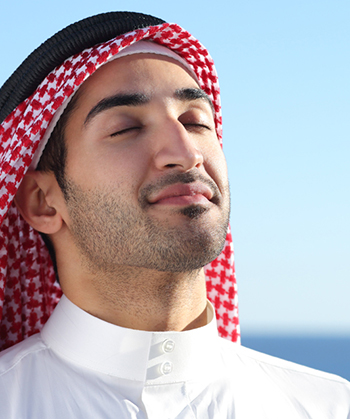

Beat dehydration during Ramadan
Staying hydrated during Ramadan can be tricky, especially with the long days and soaring temperatures that accompany the holy month when it falls during the summer.
This guidance from Weill Cornell Medical College in Qatar will help you to take enough fluids on board to make it through each day’s fast without suffering the debilitating effects of dehydration, as well as letting you know the warning signs that you are dangerously short of water.
Staying hydrated is crucial because our bodies are approximately 70 per cent water, while our brains are about 85 per cent water. Water is needed to control the body’s temperature, for transporting nutrients around the body, proper kidney function and for proper digestion, among other vital functions.
Because we lose water constantly through sweating, breathing and going to the toilet, it is imperative to keep levels topped up. Clearly, this presents a challenge during Ramadan, but you can guard against dehydration in two ways: firstly, by taking fluids on board before dawn and after sunset, and secondly, by limiting the amount of water that you lose during the day.
Outside of fasting times, drink plenty of pure, unadulterated water in frequent sips. Water hydrates the body better than fizzy soft drinks and fruit juices. Don’t drink very large amounts of water in one go, as your body won’t be able to absorb it all. Remember that foods with high water content like watermelon, grapes, apples, cucumbers, and celery will also help to keep you hydrated. Dairy products such as milk and yoghurt also contain lots of water. Avoid drinking coffee, tea and soft drinks that contain caffeine as these will make you go to the toilet more often and cause dehydration.
As the mercury climbs to over 45°C during Qatar’s summer, keeping out of the sun is very important. Even short periods outdoors will lead to rapid water loss
through sweating and faster breathing. Equally, avoid taking strenuous exercise and instead opt for lighter forms of exercise like walking or cycling at cooler times of the day.
Just because you’re not thirsty doesn’t mean you’re not dehydrated. Look out for warning signs such as yellow urine, reduced frequency or volume of urine and feeling faint or dizzy. Brown urine is a sign you are severely dehydrated and you should seek medical help.
Avoiding dehydration during Ramadan is about taking precautions by taking sensible amounts of fluids on board outside of fasting times and refraining from strenuous exercise whenever possible. Follow this advice and you will protect your health, leaving you free to concentrate on spiritual reflection during the holy month.













